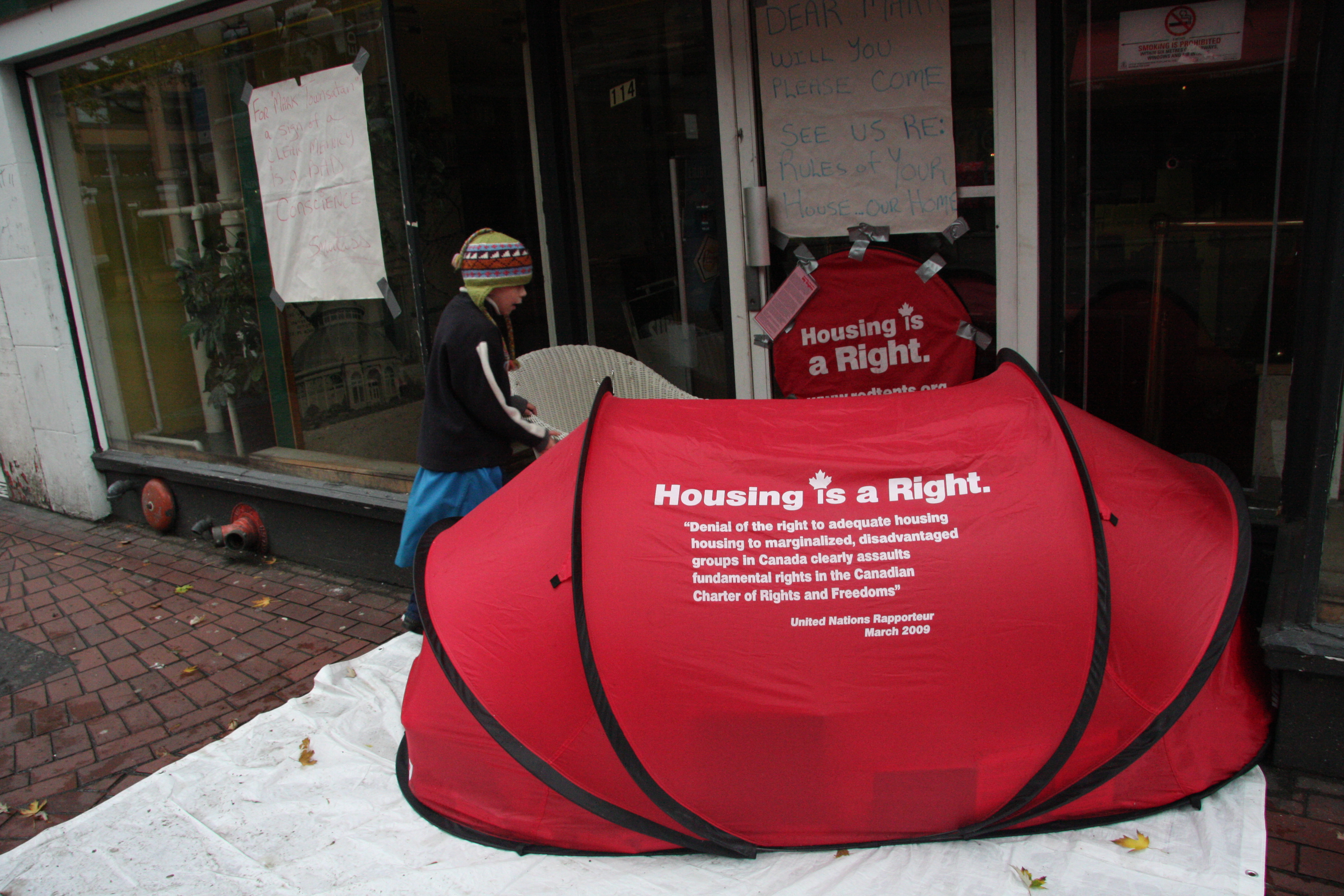Husband more often than not works from home these days, which is particularly useful on nasty winter days when snow squalls or freezing rain threaten. I have switched to indoor work now and am especially appreciative of the warm, dry and nourishing surroundings that we share. I jealously protect my solitude a little less now as the kids are in school full-time and I welcome the interesting conversations that arise between his work and mine. He’s a finance guy so the impetus for our Discussion of the Day, the impacts arising from the projected rise in interest rates in Canada, came as no surprise. The conversation turned to the massive bank foreclosures in the U.S. and the resulting homelessness.
Our rather serious midday chat sent me scrambling to find a yellowing newspaper tear-out I had pulled from The Ottawa Citizen several years ago. I remember reading the full-page “Ottawa Manifesto: Regarding homelessness in Canada” presented by the Roundtable on Poverty and Homelessness at StreetLevel 2006 in Ottawa. I remember weeping over its vision, its clarity and its magnificent, luminous, hopeful beauty.
It is a soulful pick-me-up on an otherwise difficult and depressing subject and is timely on so many levels as we enter the Christmas holiday season. While its message is couched in the language of Christian faiths, the remarkable message contained within (I believe) transcends individual belief systems, offering dignity and justice for all. We’d have to be a pretty stone-hearted lot not to be moved by this piece. And preferably moved to action.
OTTAWA MANIFESTO
Regarding homelessness in Canada
Presented by the Roundtable on Poverty and Homelessness at StreetLevel 2006, Ottawa, Canada
We, the members of the Evangelical Fellowship of Canada’s Roundtable on Poverty and Homelessness, and other signatories, are representative of the many Canadian people of Christian faith who believe that the care of poor and vulnerable people of all ages is a central tenet of our own faith, of good government, and of responsible, compassionate citizenship. We have already committed significant personal and organizational resources to this purpose. We have witnessed the rise of homelessness as a crisis of disturbing proportions, and of societal, systemic and individual complexity. The time has come to add to material action a clear, creative and challenging public voice.
We believe that Jesus Christ was and is the unique Son of God, and that he lived, died and was resurrected for our salvation. We believe that the Bible is, in its entirety, God-breathed, and that His voice may be heard clearly throughout. And we are convinced that the teaching and example of Jesus, together with the repeated testimony of the Bible, reveal that God specifically values those who are poor and rejected as having been made in His image, and, therefore, as inherently precious to Him. We are convinced of the fundamental dignity and worth of each and every human being, without qualification.
WE ALL NEED HOMES, NOT JUST HOUSING
A home is more than just four walls and a roof. It’s a whole life situation that means being welcomed into a safe, secure and dignified place to live; healthy, nurturing relationships; the opportunity for education, meaningful work for reasonable pay; and to worship, dream and play in vibrant community. Housing initiatives need to take these values into account, and aim at creating far more than “affordable” space.
WE ARE MORE ALIKE THAN DIFFERENT
Drastically different life circumstances can create the illusion that we are inherently different beings, especially when those external differences are ones that may frighten or repulse us – such as homelessness. Th ese perceived differences allow us to distance ourselves still farther, until we can easily justify our non-engagement with people who are homeless. Yet the closer we get to people, even those whose experiences, circumstances and proclivities seem completely foreign to us, the more essentially similar we find ourselves to be. People who are homeless have the same needs and longings we all share.
COMPASSION DEMANDS ACTION
Compassion is more than a feeling. Genuinely caring about people motivates us to take action. We must, therefore, apply ourselves to learn why people become homeless or are trapped in poverty, engage in social and political advocacy, make a point of getting to know people who may live outside our own “comfort zones”, and seek to share our time, abilities and material resources. All of these energies are directed at effecting material change – such as dignified housing, meaningful work, or access to health care or education – in the lives of the people for whom we have compassion.
GRACE AND MERCY ARE FOR ALL OF US
Choosing to help only those who “deserve” help and leaving behind those whose behaviours we may disapprove of is prejudicial and not Biblical. The grace and mercy of God, upon which we all rely, are, by definition, only for people who are undeserving and/or guilty. Christians, knowing themselves to be by nature undeserving, ought to be able to identify with those who appear to be homeless or poor because of their own behaviours. “God demonstrates his own love for us in this: While we were still sinners, Christ died for us.” Romans 5:8
IGNORING POVERTY IMPOVERISHES EVERYONE
Abandoning people to poverty increases health problems and welfare rolls, and sometimes drives people to crime – all major burdens for governments, and therefore, tax payers. The generational entrenchment of poverty diminishes hope (the capacity to dream) and the sense of personal value in the individual. Children, the unrealized potential of our nation, when they are born into poverty, start life so far behind others that they may never be able to catch up. The whole of society is enriched when the creative gifts of the poor are supported by governmental and social systems that affirm the value of what they have to offer. When people are shut out because of their poverty, poverty itself “snowballs”, at once increasing our societal burden and diminishing our societal capacity. Homelessness in Canada is a clear and concrete manifestation of this truth.
JUSTICE AND MERCY DEFINE GOOD GOVERNMENT
Believing that our progress is measured by our standard of care for the least privileged among us, we expect good government to formulate policy that not only works toward a level playing field, but offers “second chances” to people who have failed or done wrong. We believe that justice ought to be primarily restorative rather than punitive. We recognize that both social policies and budgets are declarations of a government’s moral intent. We will offer whatever support we can to government initiatives that are just and merciful, and will continue to use every means at our disposal to press governments at every level until such policies are made a priority. We believe that homelessness will be a priority for policy makers concerned with justice and mercy.
POVERTY BELONGS AT THE CENTRE
The Bible teaches clearly, and consistently throughout, that care of people who are poor, oppressed or marginalized is intrinsic to both the announcing of the gospel of personal salvation, and the purpose of government. Throughout western history, when governments and the church have put care of such people at the centre of their agendas, both have flourished. For perhaps 150 years, the general political and religious trends in the western world have been aimed at reducing poverty – with a significant level of success. In recent years, however, these positive trends have diminished and further marginalized people who are poor, sometimes to the point of criminalizing certain aspects of poverty. We believe that, if this trend continues, it will ultimately be disastrous for our country and our churches. The church in Canada has a responsibility to provide moral leadership by making a priority of caring for people who are poor, and particularly people who are homeless, in its own budgets and activities.
GOVERNMENT RESPONSIBILITY DOES NOT EXCUSE CHURCH APATHY
While various levels of government clearly have a responsibility to address these matters, the church must not succumb to a theological dichotomy whereby we construe the church’s responsibilities to concern only the spiritual, and the government’s only the physical. As communities of faith, we have different capacities than governments or social service organizations. We must be ready to provide creative leadership in some circumstances, and partnership or humble servanthood in others, in order to create realistic, dignified and sustainable options for people who are homeless.
CHRISTIAN GROUPS MAKE GOOD PARTNERS FOR GOVERNMENT INITIATIVES
Christian groups have for many years been the largest non-government service provider to the poor and homeless in North America. In fact, many social services now funded and directed by government were begun by such groups. Since Christian teaching and practice encourages the development of functioning communities, a high level of volunteer participation, and the donation of money and other resources, we can often achieve more with less, adding value and offering a wealth of experience and healthy community context to government resources. Already existing Christian communities offer a holistic context for the development or implementation of services and programs that government is not equipped to create on its own. We encourage Christian groups to support and partner, wherever possible, with government initiatives aimed at the substantial reduction of homelessness, poverty, and their root causes.
THEREFORE, TO OUR BROTHERS AND SISTERS WHO STRUGGLE WITH POVERTY AND HOMELESSNESS, WE COMMIT TO…
LEARN all we can about the systemic, sociological, economic, cultural and spiritual deficits that have left them in this state. We will listen carefully to them, for they are our greatest teachers. We will seek out the knowledge others have acquired, and teach what we ourselves have learned to those who want to care more effectively for people who are poor or homeless;
ACT with diligence and integrity to create with them healthy, nurturing relationships, and safe, secure, dignified homes;
SPEAK on their behalf when their own voices are not heard, and support them in speaking for themselves, to the end that Canadian churches, governments, media and businesses would make the substantial reduction of homelessness, poverty and their root causes a high priority; and
COOPERATE with others committed to these baseline objectives, respecting differences of approach and philosophy.
BEFORE GOD, WE MAKE THESE COMMITMENTS IN THE PLACES WHERE WE WORK AND SERVE, IN OUR COMMUNITIES OF FAITH, AND IN OUR PERSONAL LIVES.

